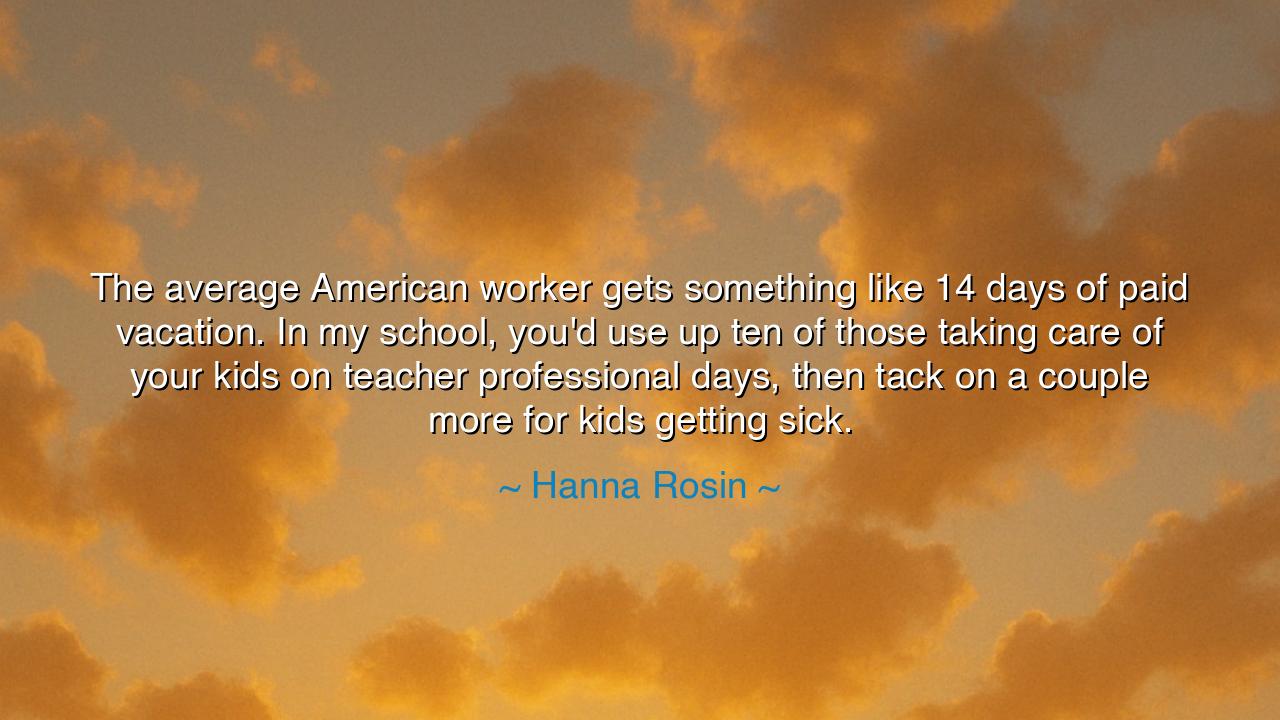
The average American worker gets something like 14 days of paid
The average American worker gets something like 14 days of paid vacation. In my school, you'd use up ten of those taking care of your kids on teacher professional days, then tack on a couple more for kids getting sick.






In the words of Hanna Rosin: “The average American worker gets something like 14 days of paid vacation. In my school, you’d use up ten of those taking care of your kids on teacher professional days, then tack on a couple more for kids getting sick.” These words, though plain in appearance, are heavy with the burden of modern life. They speak not merely of schedules or calendars, but of the chains that bind men and women in the age of labor and family. In them we hear the voice of a society where time, that most precious gift, is consumed not in rest, not in joy, but in the endless duties of survival and care.
For what greater paradox is there, than that one toils a year long only to be granted 14 days of paid vacation? This, the meager coin of rest, is placed in the hand of the worker as though it were a gift, yet it is so small that it cannot even fulfill its promise. For soon it is swallowed by necessity: the sick child, the teacher’s absence, the unexpected demands of life. Thus, what was meant to be a fountain of refreshment becomes instead a reservoir drained by duty, leaving the worker weary, still parched of leisure.
Consider the tale of the American laborer in the early 20th century. In those days, men and women fought with courage for the right to a weekend, to a shortening of the cruel hours of toil in factory and mill. Their struggle was heroic, and many suffered beatings, hunger, even death for this cause. Yet, even as their victory was won, still the burden remains, for the balance between work and rest has never been settled. Rosin’s words remind us that though chains may have changed in shape, the weight of labor still bends the back of the common soul. The spirit cries out not only for bread, but also for time.
And let us reflect upon another example: the nations across the seas, where workers are granted not 14 days but thirty, sometimes more. In those lands, it is recognized that rest is not a luxury but a necessity, that the mind and the body flourish when given seasons of renewal. How then does it come to pass that in the land of plenty, the worker is so starved of leisure? The answer lies not only in law, but in culture—the unyielding idol of productivity, before which even joy and family must bow.
But let us not hear these words as lament alone. Within them lies also a hidden call to wisdom. For the truth is that time will always be stolen if it is not guarded. Even the paid vacation given may be devoured by life’s demands. Therefore, the wise must carve out moments of rest, not only when granted by others, but by deliberate will. Just as a gardener tends a small patch of earth amidst the wilderness, so must each soul claim its portion of stillness, even if the world does not provide it.
The lesson then is twofold. First, we must strive together as communities and nations to honor the laborer with rest, to raise our voices as those before us did, demanding that life not be consumed only by work. Second, on the personal path, we must learn to protect the sacred hours, to say no when duty threatens to devour all. To take one day, one evening, one morning of quiet, and hold it fiercely, as a treasure none can take away.
So I say to you: remember Rosin’s lament, but do not sink into despair. Instead, let it awaken you. If your 14 days of vacation vanish, create a fifteenth with your courage. If your time is stolen, reclaim it with intention. For time is the coin of life, and if you spend it only in duty and never in joy, then you have allowed the greatest theft of all. Work, yes. Care for family, yes. But also live, also rest, also breathe deeply of the world. In this balance lies the strength to endure, and the wisdom to thrive.
For though the world may give you little, the power to guard your time lies within your own heart. And when enough hearts rise together, demanding rest and wholeness, even the great engines of labor shall bend. Let this truth be passed down: that rest is not weakness, but strength; not waste, but wisdom. Guard it well.






AAdministratorAdministrator
Welcome, honored guests. Please leave a comment, we will respond soon